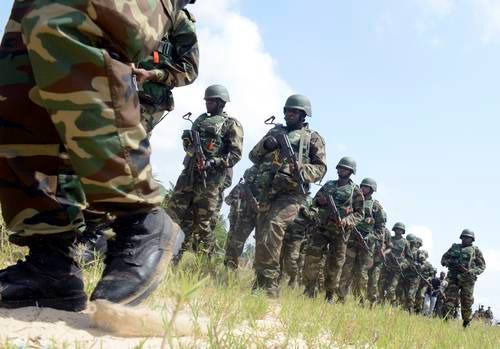Nigeria’s security landscape has, over the decades, witnessed the loss of several high-ranking military officers to terrorism, targeted killings, and politically motivated assassinations.
From the era of military coups to the ongoing fight against insurgency, these incidents reveal the immense risks carried by senior commanders and the profound implications for national security.
This article provides a detailed examination of notable Nigerian generals and senior officers who were killed either by terrorist groups or through coordinated assassinations.
Read Also: Atiku urges Tinubu to resign over escalating insecurity
Brigadier General Musa Uba – 2025 (Claimed by ISWAP)
In November 2025, the Islamic State West Africa Province (ISWAP) claimed responsibility for capturing and executing Brigadier General Musa Uba during a military patrol near Wajiroko in Borno State.
The claim, circulated through the ISIS-affiliated Amaq news agency, alleged that the general was seized during combat operations before being killed.
The Nigerian Army swiftly dismissed the report as “fake news”, asserting that no officer of his rank had been captured.
However, the ISWAP claim renewed concerns about the group’s evolving capabilities and their continued ambition to target senior commanders.
Whether fully verified or not, the alleged incident underscores the heightened threat level facing military leadership in the Northeast theatre of operations, where insurgent factions have increasingly adopted high-impact propaganda tactics and targeted attacks.
Brigadier General Dzarma Zirkusu – 2021 (Killed in ISWAP Ambush)
A confirmed and widely mourned loss occurred in November 2021, when Brigadier General Dzarma Zirkusu was killed during an ISWAP assault on Askira Uba in Borno State.
The general, who commanded a sector within the counterinsurgency framework, was responding to a distress call when militants ambushed his convoy. Three other soldiers also died in the attack.
General Zirkusu’s death was regarded as a significant blow to Nigeria’s counterterrorism efforts, given his experience and the strategic role he played in stabilising vulnerable communities.
The incident highlighted the increasing sophistication of ISWAP operations and the ability of insurgents to launch coordinated offensives targeting both troops and their senior leaders.
Major General Hassan Ahmed – 2021 (Assassinated by Armed Gunmen)
In July 2021, Major General Hassan Ahmed, a former Provost Marshal of the Nigerian Army, was assassinated along the Lokoja–Abuja highway.
Gunmen intercepted his vehicle near the Ahoko area of Kogi State, opening fire and killing him at the scene. His wife, who was travelling with him, was abducted during the attack.
General Ahmed’s killing shocked the military community, not only because of his seniority but also because the attack occurred far from any known conflict zone.
Though the motive was not conclusively established, the incident underscored the widespread reach of armed criminal gangs and the growing insecurity along Nigeria’s major highways. His death brought renewed attention to the threat posed by kidnappers and bandits who increasingly target high-profile individuals.
Major General Johnson Aguiyi-Ironsi – 1966 (Assassination in Counter-Coup)
One of Nigeria’s most defining political assassinations occurred on July 29, 1966, when Major General Johnson Thomas Umunnakwe Aguiyi-Ironsi, Nigeria’s first military Head of State, was killed in a counter-coup.
The coup was orchestrated by a group of northern officers who opposed Ironsi’s unification policies and sought to avenge the January 1966 coup, which had already destabilised the political landscape.
Ironsi was abducted from the Government House in Ibadan alongside his host, Lt. Colonel Adekunle Fajuyi, and subsequently killed.
His assassination plunged the nation into deeper ethnic and political tensions, setting the stage for the Nigerian Civil War. It remains one of the most consequential military assassinations in the country’s history.
General Murtala Ramat Muhammed – 1976 (Assassinated in a Failed Coup Attempt)
Another high-profile loss occurred on February 13, 1976, when Nigeria’s Head of State, General Murtala Muhammed, was assassinated in Lagos during a failed coup led by Lt. Colonel Buka Suka Dimka.
The attackers ambushed his motorcade in Ikoyi, riddling his official car with bullets. Murtala, known for his decisive leadership and sweeping reforms, died instantly alongside his aide-de-camp.
The coup collapsed within hours, and Dimka was eventually arrested and executed for treason. Murtala’s assassination left a lasting imprint on Nigeria’s political and security trajectory.
His short-lived administration remains one of the most celebrated in Nigeria’s military history, and his death is widely regarded as a national tragedy.
Vice Admiral Babatunde Elegbede – 1994 (Targeted Assassination)
Vice Admiral Muftau Babatunde Elegbede, a former Director of the Defence Intelligence Agency and a major figure within Nigeria’s security establishment, was assassinated on June 19, 1994.
Gunmen intercepted his vehicle on the Gbagada–Oworonshoki Expressway in Lagos and opened fire, reportedly hitting him multiple times before fleeing the scene.
Despite arrests and investigations, the true motive behind Elegbede’s killing was never definitively established.



